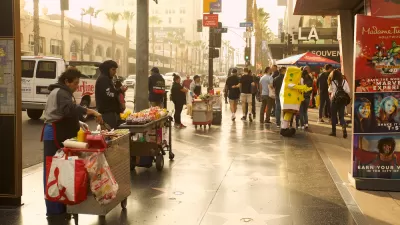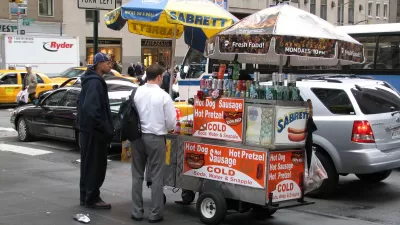The District’s new regulations lower permit fees, reduce barriers to entry for vendors, and decriminalize vending offenses.

Writing in Next City, Oscar Perry Abello asserts that “Street vending is supposed to be the informal version of commerce. In this country, lawmakers and law enforcement have made attempts to codify street vending, and usually it gets pretty ugly, pretty quickly.”
But Abello goes on to express optimism that Washington, D.C.’s new street vending regulations could strike the right balance of regulatory oversight and the practical considerations of street vendors.
The District’s street vendor licensing and permitting fees are now dramatically lower, as are fines for violations. Criminal background checks are no longer permitted as part of the street vending application process, meaning unpaid parking tickets or previous incarceration are no longer barriers to obtaining D.C. street vendor licenses or permits. Street vending violations are no longer a criminal offense, and no longer enforced by the police department.
For organizers in D.C., the victory hinged on narrative change, Abello writes. Advocates worked to change the public perception of street vending and highlight the vulnerability of vendors. The new law creates a framework for integrating vendors into the streetscape and creating “a commons-like relationship with street vendors.”
FULL STORY: D.C.’s Street Vendor Regulations Formalize The Informal

Planetizen Federal Action Tracker
A weekly monitor of how Trump’s orders and actions are impacting planners and planning in America.

Restaurant Patios Were a Pandemic Win — Why Were They so Hard to Keep?
Social distancing requirements and changes in travel patterns prompted cities to pilot new uses for street and sidewalk space. Then it got complicated.

Map: Where Senate Republicans Want to Sell Your Public Lands
For public land advocates, the Senate Republicans’ proposal to sell millions of acres of public land in the West is “the biggest fight of their careers.”

Maui's Vacation Rental Debate Turns Ugly
Verbal attacks, misinformation campaigns and fistfights plague a high-stakes debate to convert thousands of vacation rentals into long-term housing.

San Francisco Suspends Traffic Calming Amidst Record Deaths
Citing “a challenging fiscal landscape,” the city will cease the program on the heels of 42 traffic deaths, including 24 pedestrians.

California Homeless Arrests, Citations Spike After Ruling
An investigation reveals that anti-homeless actions increased up to 500% after Grants Pass v. Johnson — even in cities claiming no policy change.
Urban Design for Planners 1: Software Tools
This six-course series explores essential urban design concepts using open source software and equips planners with the tools they need to participate fully in the urban design process.
Planning for Universal Design
Learn the tools for implementing Universal Design in planning regulations.
Heyer Gruel & Associates PA
JM Goldson LLC
Custer County Colorado
City of Camden Redevelopment Agency
City of Astoria
Transportation Research & Education Center (TREC) at Portland State University
Camden Redevelopment Agency
City of Claremont
Municipality of Princeton (NJ)





























